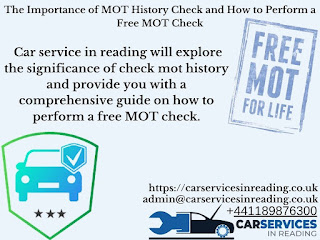Key Components Checked During MOT Reading
During an MOT reading or MOT test,
several key components of a vehicle are thoroughly checked to assess its
roadworthiness and safety. The specific components examined may vary slightly
depending on the country or region, but generally, the following areas are
assessed:
- Vehicle
Identification:
- Vehicle
registration and identification numbers
- Number
plates and their visibility
- Lights
and Electrical Systems:
- Headlights,
indicators, brake lights, fog lights, and other external lights
- Interior
lights, dashboard indicators, and warning lights
- Battery
condition and electrical wiring
- Steering
and Suspension:
- Steering
system operation, including the steering wheel, column, and linkage
- Suspension
components and their integrity
- Shock
absorber functionality and condition
- Braking
System:
- Brake
pedal effectiveness and travel
- Brake
fluid level and condition
- Brake
pads, discs, shoes, and drums for wear and effectiveness
- Handbrake
functionality and strength
- Tires
and Wheels:
- Tread
depth and condition of all tires
- Tire
pressure and correct fitting of the wheels
- Wheel
bearings and alignment
- Seatbelts
and Seats:
- Seatbelt
functionality and condition
- Seat
positioning and security
- Body
and Structure:
- General
condition of the vehicle's bodywork
- Integrity
of doors, bonnet, boot, and tailgate
- Corrosion
or damage to the vehicle structure
- Exhaust
and Emissions:
- Exhaust
emissions to meet environmental standards
- Exhaust
system condition, including the catalytic converter
- Fuel
System:
- Fuel
tank and fuel lines for leaks and security
- Vehicle
Visibility and Mirrors:
- Windscreen
condition, including chips and cracks
- Rearview
mirrors and their adjustment
- Other
Components:
- Horn
functionality and audibility
- Windscreen
wipers and washers
It's important to note that the MOT reading or test aims to
ensure the vehicle's compliance with safety and environmental standards. If any
of these components are found to be faulty, excessively worn, or not
functioning correctly, the vehicle may fail the MOT test and require repairs or
replacements to meet the necessary standards.




Comments
Post a Comment